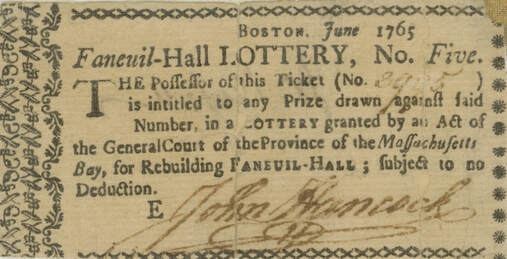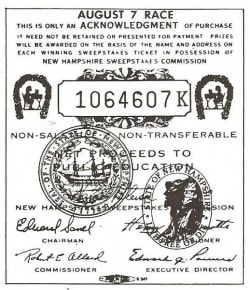|
Two New Jersey scratch-off lottery tickets were tucked in a birthday card. I knew I didn’t win but I became intrigued by the concept of lotteries. I discovered they have a long history traceable to ancient times. According to the North American Association of State and Provincial Lotteries (NA, a type of lottery funded the building of the Great Wall in China. In the Old Testament, in the book of Numbers (26: 55 – 56) Moses takes a census of the people of Israel and divides the land among them by lot. Emperors Nero and Augustus had lotteries to give away property and slaves during Roman festivals and holidays. Burgundy and Flanders in the 15th century held some of the first European lotteries. The funds were used for defense or aid to poor. Ventura, considered to be the first European lottery to award monetary prizes, was held in the Italian city-state of Modern in 1476. However, the lottery that came to serve as the model for modern lotteries was the Genoese Lottery named for the game which originated in the Italian city of Genoa in the 17th century. It quickly spread to other Italian cities and elsewhere. Italy’s first national lottery was created in 1863 providing income for the unified Italian nation. In 1566, England’s Queen Elizabeth l needed to raise money for repairing harbors and other public projects. She had two choices: levy a new tax on her citizens or hold a lottery. Elizabeth I established England’s first state lottery. The cost was high, limited pool of 400,000 and included other goods. To sweeten the pot, all participants would be granted immunity from arrest, felonies or treason. The Irish Hospitals’ Sweepstakes, commonly known as the “Irish Sweepstakes” begun in the 1930s was established to fund hospitals. A state lottery replaced it in 1987. The Sydney Opera House in Australia was another large-scale project underwritten with lottery funds. Lotteries found their way to our shores in 1621 to help finance the Jamestown settlement. Then again in 1776 when the Continental Congress established a lottery to raise funds for the American Revolution. Even though that lottery was jettisoned, over time other localized private lotteries were created. One example was the lottery that raised money to rebuild Boston’s Faneuil Hall after a devastating fire in 1761. Proceeds from other public lotteries aided in the building of many colleges. In 1814, the Queen’s College (now Rutgers University) in New Brunswick, NJ was a beneficiary of lottery proceeds. The popularity of lotteries has ebbed and flowed marred by corruption, scandals and shifting public sentiment. Louisiana’s lottery was enormously successful over its 25-year run from 1869 – 1894 in all states. In 1890, President Harrison and the Congress condemned lotteries as “swindling and demoralizing” and prohibited the interstate transportation of lottery tickets. These actions had a chilling effect and Louisiana was the last U.S. state lottery until 1964 when New Hampshire launched its own sweepstakes on March 12, 1964. The New Jersey State Lottery was launched In November, 1969. New Jersey voters overwhelmingly approved a constitutional amendment that called for the establishment of a State Lottery as part of the general election. The 81.5 percent majority in favor of a Lottery was one of the largest in New Jersey political history. On December 16, 1970, the first lottery ticket was sold to Gov. William T. Cahill. Net proceeds of the lottery are constitutionally dedicated to benefit state institutions and state aid for education. The lottery generates approximately $1 billion dollars annually in net proceeds. However, beginning in 2018, the Lottery's net proceeds for a 30-year term will used to bolster New Jersey's critically underfunded public employee pension system for teachers, police and fire personnel and other public employees in conformance through the Lottery Enterprise Contribution Act, P.L. 2017, c.98 passed on July 4, 2017. At the end of this 30-year contribution term, the state pension plans are expected to be 90 percent funded. In year thirty-one, the lottery enterprise reverts back to the state. There are only five US states currently without a state lottery: Alabama, Alaska, Hawaii, Utah and Nevada. The absence of the lottery in Alabama, Hawaii and Utah reflect the potential implications of gambling. However, Alaska’s abundant oil resources provide extra state funds. Nevada sources additional state funding through casino gambling profits. Click on this link for the North American State and Provincial Lotteries (NASPL) to see how the remaining 45 states with lotteries use their lottery net proceeds. Please note that the information on the NASPL website reflects data collected for the fiscal year 2016. https://www.naspl.org/wherethemoneygoes SOURCES: Lewis, Danny. "Queen Elizabeth I held England’s first official lottery 450 years ago." Smithsonian Magazine , 13 Jan. 2016, Accessed 29 https://bit.ly/3NtWJWR Mar. 2022. Herman, Robert D. and Glimne, Dan. "lottery". Encyclopedia Britannica, 5 Mar. 2013, https://www.britannica.com/topic/lottery. Accessed 29 March 2022. "Interesting facts about the Sydney Opera House 15 pieces of useful trivia about the beloved building." Sydney Opera House , www.sydneyoperahouse.com/our-story/sydney-opera-house-facts.html. Accessed 29 Mar. 2022. "History: giving dreams a chance since 1970." New Jersey State Lottery , www.njlottery.com/en-us/aboutus/history.html. Accessed 29 Mar. 2022. Petrecca, Steven M. "The Lottery Enterprise Contribution Act - Why it is important ." New Jersey Department of the Treasury, The Bond Buyer , 25 July 2017, https://bit.ly/3qIOLiL. Accessed 29 Mar. 2022. LegiScan, legiscan.com/NJ/S3312/2016. Accessed 29 Mar 2022 "Where does the money go?" North American Association of State and Provincial Lotteries, www.naspl.org/wherethemoneygoes/. Accessed 29 Mar. 2022.
0 Comments
Your comment will be posted after it is approved.
Leave a Reply. |
Curiosity Corner writer & contributor:Helen Beckert, Reference Librarian at the Glen Ridge Public Library Archives
June 2023
Categories |
|
Glen Ridge Public Library
240 Ridgewood Avenue Glen Ridge, NJ 07028 Phone: 973-748-5482 Email: [email protected] © 2024 Glen Ridge Public Library Site last updated July 15, 2024 |
LIBRARY HOURS Monday 9 am - 8 pm Tuesday 9 am - 8 pm Wednesday 9 am - 8 pm Thursday 9 am - 5 pm Friday 9 am - 5 pm Saturday 9 am - 5 pm Sunday CLOSED |





 RSS Feed
RSS Feed
